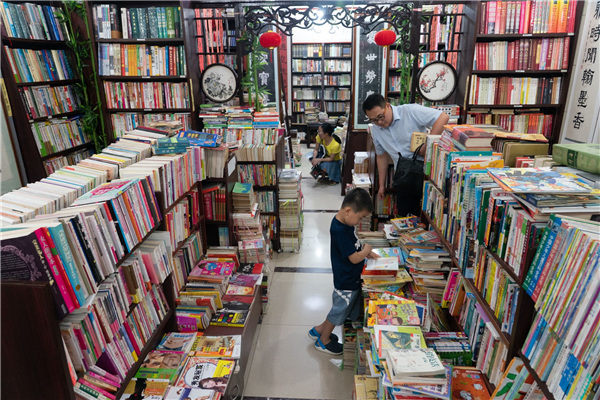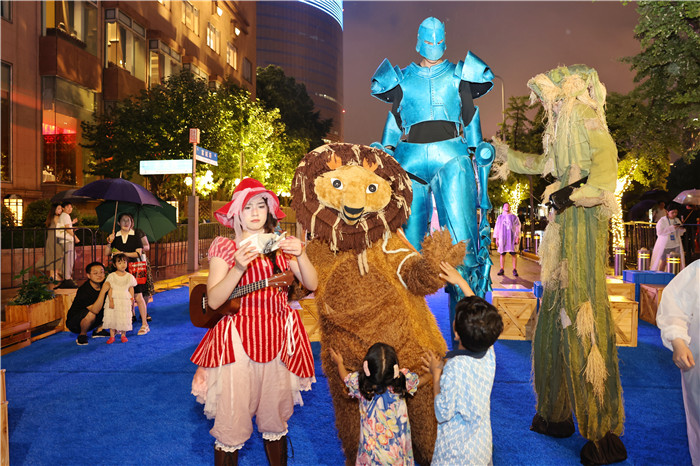The charm of old, yellowed pages

Xiaozhu's Bookstore in Shanghai's Pudong New Area welcomes about 100 customers every day. [Photo by Gao Erqiang/China Daily]
Meet the people who find joy in collecting old tomes and publications filled with tattered pages and scribblings by previous owners.
To many Shanghai residents, the bookstore that has the most comprehensive selection of books in the city is not a sprawling, multistory complex, nor is it an on-trend, achingly hip establishment that comes with a cafe and lifestyle area.
Located on Lancun Road in Pudong New Area, Xiaozhu's Bookstore looks to be the very antithesis of such establishments. Measuring just 115 square meters, the store features a decor that is austere at best. The only form of decoration here is the framed Chinese calligraphy works found on the shelves.
Moreover, the store sells only secondhand books.
"I don't run this place to make money," quips the owner Zhu Fengtao, who opened the store after retiring a decade ago.
"Running a secondhand bookstore, especially a physical one, isn't a profitable business these days as people can simply buy books online. I do this because I don't like traveling or playing mahjong like most elderly people. Rather, I just love reading. I also hope that my store can help others relax, especially those who earn a lot of money but face much pressure."
But the diminutive nature of the shop is hardly a reflection of the fact that it is an impressive repository of books. In addition to the 60,000 used titles, ranging from novels to comics to magazines and journals, found in the shop, the 63-year-old retiree also owns another 240,000 that are stashed in six warehouses.
Zhu's fascination with used books appears to run in the family. His father, who left his hometown in Jiangsu province to find work in Shanghai in the 1940s, used to run a stall selling comics before working at a secondhand bookshop.
Like his father, Zhu traveled to Shanghai to find job opportunities when he was 21. He has lived in the city since.
"It was a popular job at that time," says Zhu, referring to his father's profession.
"Following the reform and opening-up of the country after 1978, a large number of domestic and foreign literature books were published. Whenever the new books were sold out, people would flock to the secondhand bookstores to try their luck."
Running a bookstore might seem hardly exciting, but Zhu claims he is never bored. Besides categorizing the books on the shelves, the retiree also has to spend considerable amounts of time curating his collection and appraising purchases before setting a reasonable resale price.
The fact that Xiaozhu's Bookstore has been in business for more than a decade speaks volumes about its clout with local readers. This was also evidenced by how quickly business returned to normal following its temporary closure because of COVID-19. Today, it welcomes about 100 customers every day.
Among Zhu's regular customers is Hu Yongchu, a doctor at the anesthesia department of Shanghai Changzheng Hospital.
"Many forgotten treasures can be found between the tattered pages of used books," says Hu, who buys mostly medical titles.
"I do not merely obtain knowledge from the books. Oftentimes, I would get autographs, notes or sketches on the pages created by previous owners who are renowned experts in the industry," he says.
This was certainly the case for Zhu Nan. While searching for books by the late Feng Chengjun, an expert in East-West communications, Zhu chanced upon a 1935 translated edition of the book Timurid Empire in an online secondhand bookstore.
"Interestingly, the original owner of the book was the famous Chinese poet Dai Wangshu, and a subsequent owner was his friend-the writer Shi Zhecun," says Zhu. He ended up buying the book from a friend in 2017.
"I call this destiny. My life and the stories of celebrities I admire are somehow intertwined through this book."
For others, like Zhao Guozhong, the charm of secondhand bookstores lies in the thrill of exploration.
"I never know what I will find when foraging through secondhand bookstores. That's where the fun lies," says Zhao, who likes collecting literature books published in the Minguo period (1912-49).
Xu Zihao, owner of a culture company in Shanghai, says that while foreign embellishments on antiques might devalue the artifact, such additions could at times add even more value to old books.
One example is his copy of a book on plant systems that was written by famous Chinese botanist Lu Kaiyun. His copy, which was printed in 1934 for academic purposes only, features annotations made by another renowned botanist, Hu Xiansu.
"There are more than 800 notes in this 388-page book. In the version that was made available to the public in 1936, you can see that the original book was edited according to these notes. This shows Hu's expertise and his dedication to the unification of botanical terms. The value of such a book is unrivalled," says Xu, who compares amassing a collection of secondhand books to collecting antiques.
"Books outlive humans, and we are just temporary owners," he adds.
"A cheap secondhand book today could very well be a piece of treasure tomorrow."
 Contact Us
Contact Us

 Brilliant light show to illuminate Huangpu River
Brilliant light show to illuminate Huangpu River Maple leaves paint splendid scenery in Pudong
Maple leaves paint splendid scenery in Pudong Appreciate alluring lotus blossoms in Pudong's Century Park
Appreciate alluring lotus blossoms in Pudong's Century Park New pedestrian street boosts Pudong's night economy
New pedestrian street boosts Pudong's night economy 


